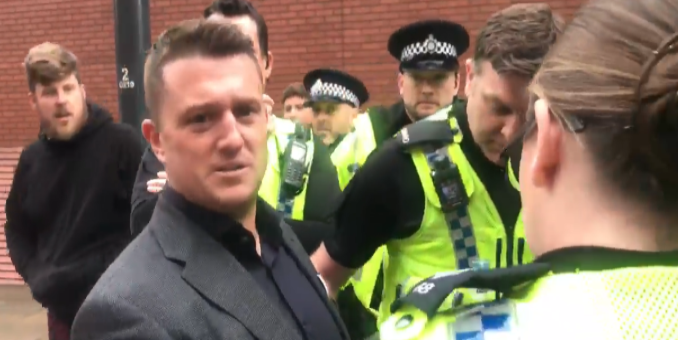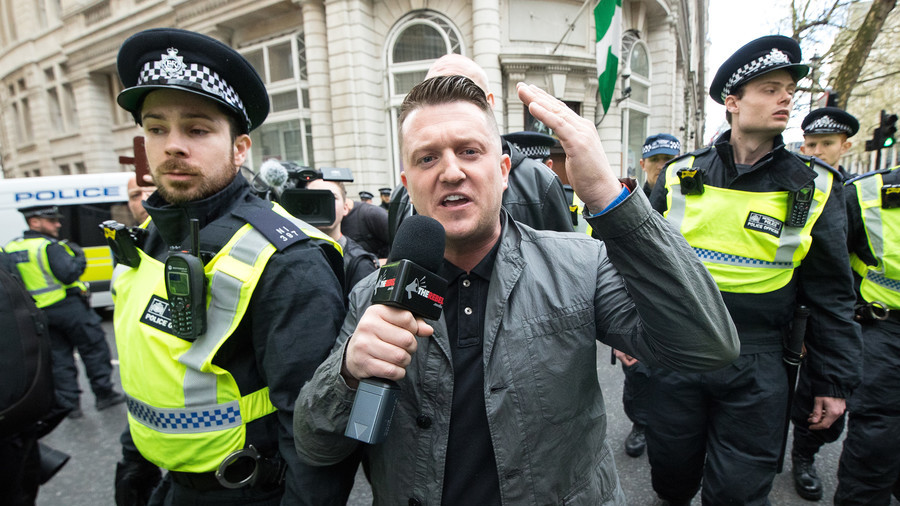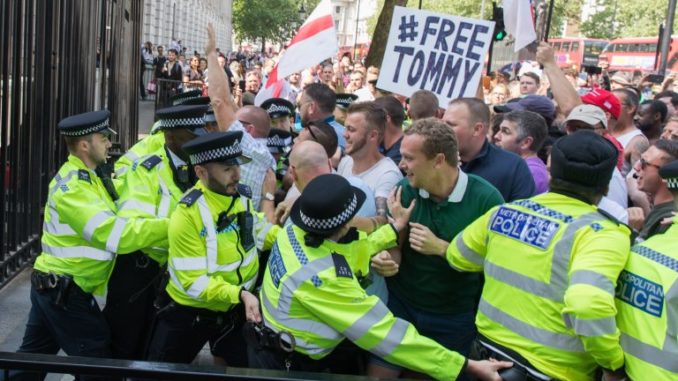
Anti-Islam activist ‘Tommy Robinson’ has been given a 13-month jail term for contempt of court, after live-streaming confrontations with defendants in a child grooming case outside Leeds combined courts on Friday.
He was already serving a suspended sentence for the same offence, so was lucky to avoid a maximum potential jail term of two years.
If elements of the online alternative media are to be believed, the former EDL leader was there to innocently report on the case as a journalist and has been bravely exposing Muslim paedophiles when the mainstream won’t. The state, fearing Robinson and not wanting to upset the Islamic community, had him spirited off and secretly jailed where he risks being murdered. This signalled the end of free speech and Orwell’s nightmare come true.
While Tommy’s conviction might seem unjustified at first glance, a judge ruled that he risked prejudicing the very grooming case he claims to want justice for.
Here’s why …
The Right to a Fair Trial
Tommy’s supporters (our American friends especially) need to be aware that Britain enforces the right to a fair trial above all else.
Members of the media are quite regularly held accountable when they infringe on this right. It’s not unique to Tommy Robinson, in fact those using George Orwell clichés might be surprised to learn that contempt of court law certainly existed in some form during Orwell’s day too.
Under the most recent Contempt of Court Act (1981), someone may be in contempt if they create a “substantial risk of serious prejudice or impediment” to court proceedings. In other words, if there’s a high risk that they’ll influence the jury or witnesses, or otherwise prevent a trial from running smoothly.
It is a ‘strict liability’ offence, which means ignorance or intent is not taken in to account. If you commit the crime, you will do the time. ‘Just reporting on paedos,’ is therefore not an excuse if that reporting is in contempt, which we’ll explore below.
But, how does it work?
Broadly, when a case is active (from the point of arrest until release or the trial concludes), the media are not allowed to assassinate the character of the accused, dredge up past convictions, or insinuate guilt. They are also not allowed to publish evidence that isn’t part of the trial (whether that be from firsthand research, interviews with witnesses, or evidence from preliminary hearings that won’t be used by the prosecution).
Stories published prior to an arrest that contain such information are not to be re-published and may be temporarily taken offline until the trial is over. Depending on how much time has passed, these stories are often overlooked because of the ‘fade factor’ (i.e. people forgetting the story).
The prime reason for all of this is to prevent the jury from being influenced by anything other than what’s presented in the courtroom, i.e. the facts of the case. We don’t want a ‘trial by media.’
Of course, this isn’t infallible, jurors might read about the case prior to trial, and will often do a bit of Googling and talk to friends during the proceedings (even when instructed not to). Thus, enforcing strict contempt laws on the media (most people’s source of information) is one way to mitigate any outside influence on jurors.
Take these examples of the law being enforced: In 2011, two national newspapers were found guilty of contempt of court for publishing photographs of a defendant in a murder trial because he was shown posing with a gun. The photo was not related to the case or shown in court, and therefore could have influenced the jury against him – “Well he posed with a gun, he must be the sort to do this.”
ITV News was fined £25,000 in 2008 after they broadcast a piece about a trial of 5 men accused of murder and revealed that one had a previous murder conviction – “If he’s done it before, he probably did it this time.”
John Anthony Hill found himself in hot water for sending his conspiracy documentary ‘7/7 Ripple Effect’ to a judge and jury foreman during the trial of alleged accomplices in the London Bombings, a topic WideShut has covered extensively without impeding court proceedings.
More importantly, contempt of court also applies to those in the courtroom. In 2013 a juror was jailed for two months for writing on Facebook that he wanted to: “F**k up a paedophile and now I’m within the law!”
The defendant was on trial, not a convicted paedophile. The juror hadn’t even heard the case yet and as evident, he was not within the law to “f**k up” someone he prejudicially believed was a paedophile.
Unauthorised filming and picture taking in the court and its precincts are also considered contempt of court. Most trained journalists know to keep their cameras away from the grounds and on the street outside, though others such as 19-year-old Paul Thompson aren’t as informed (even when signs are posted all over court buildings) and get jail terms for their ignorance.
Think about it, if you were accused of rape or any other crime, would you want the press dragging up past dirt or suggesting you must be guilty for one reason or another? Would you want to be confronted by someone with a camera on your way to and from court, shouting about your guilt and putting the clip on the TV or internet?
You are rightly innocent until tried by a jury of your peers and proven guilty in a court of law.
Open Justice
When it comes to trials, the media’s role is to promptly and accurately report what happens in court during a trial, including the evidence presented, the prosecution’s case against the accused, their defence, and the eventual verdict – all without opinion, conjecture, and third-party evidence. Journalists have ‘absolute privilege’ to do this and do so every single day.
Sex crime cases and those involving juveniles understandably have additional restrictions to prevent identification, but journalists can otherwise name the defendant and report the details of the crime as heard in court, as long as it doesn’t lead to the identification of those protected. The Sun fell foul of this when their disguising of a photograph of a 15-year-old victim wasn’t deemed enough to prevent her identification by those that knew her.
This is open and fair justice.
Before a trial begins, the media can also report who has been arrested, what they are accused of, and the basic details of the crime (what, when, where). Some speculation is expected, as long as it isn’t tied to prejudicial statements about the defendant.
It is only before an arrest or after the trial that other evidence and opinions that would otherwise be prejudicial can be safely published, but that doesn’t protect from defamation/libel. I.e., at these stages, it’s not contempt to speculate about the evidence, to accuse someone else of the crime, to say the verdict was incorrect, or suggest police failure, but you can still be sued for doing so.
Tommy Robinson is a Risk

Last May, Stephen Yaxley-Lennon (Tommy’s real name), was sentenced to 3 months, suspended for 18 months, for contempt of court. As outlined in the court transcript he illegally filmed inside a court building and labeled defendants accused of rape as “Muslim paedophiles” and other prejudicial terms. He then published the video online under the title “exposing Muslim child rapists.”
Tommy, therefore, committed two forms of contempt – filming inside a court or its precincts and implying the defendants were guilty before the trial had concluded.
His controversial presence also risked impeding the proceedings in other ways.
“I gave directions in order to ensure that both the jury and in due course the defendants, were escorted from court by different routes in order to avoid there being any kind of confrontation or interference,” said Her Honour, Judge Norton.
“That was not a decision that I took lightly, because, of course, diverting the jury from anything other than their usual route may have given rise to questions in their mind about what was going on and why.”
In summing up, Tommy was warned explicitly not to repeat this behaviour or his suspended sentence would be triggered.
“…if you commit any further offence of any kind, and that would include, I would have thought a further contempt of court by similar actions, then that sentence of three months would be activated, and that would be on top of anything else that you were given by any other court. In short, Mr. Yaxley-Lennon, turn up at another court, refer to people as ‘Muslim paedophiles, Muslim Rapists’ and so on and so forth while trials are ongoing and before there has been a finding by a jury that that is what they are, and you will find yourself inside. Do you understand?”
This brings us back to Friday when Tommy Robinson live-streamed to his thousands of followers outside the courts in Leeds.
Taking into account his past behaviour and that the crime for contempt is about “risk,” his arrest is nowhere near as shocking as some would like to believe. It’s entirely reasonable.
He was once again filming on court grounds (albeit not inside any building) – something trained journalists still refrain from doing unless the public paving runs outside the entrance because the finer detail of the law is ambiguous.
He also confronted defendants and asked them: “How are you feeling about your verdict?”
He got an apt response: “What verdict?”
Even on a day when a verdict is expected, jury deliberations can still run long, their decisions can change, and the verdict can be delayed. And, legally speaking, the case is still active (and contempt still applicable) until the moment there is an acquittal or a judge gives a sentencing.
Furthermore, he once again insinuated guilt with numerous phrasings that we cannot repeat here for risk of repeating his crime.
He also gave out the charges of the defendants incorrectly, either because the reports he was reading were from last year’s preliminary hearing at magistrates court (before the crown court trials) or he simply got it wrong.
Judge Geoffrey Marson QC notes that: “He referred to the charges that the defendants faced and some charges which are not proceeded against in relation to some defendants.”
Tommy wasn’t just repeating what the media had reported, he was repeating information reported long ago or otherwise incorrectly, and applying it to the present trial that also has reporting restrictions on it.
So, we have a situation where someone on a suspended sentence for committing contempt of court is committing contempt of court again in several ways, and live-streaming it, which exacerbates the risk of compromising the trial.
Police can’t warn him to stop and delete footage before publishing it because it’s instantly published.
What if he got more confrontational? What if he tried to enter the court? What if he caused a scene and jurors or defendants couldn’t or refused to enter – impeding the proceedings?
“Not only was it a very long video, but I regard it as a serious aggravating feature that he was encouraging others to share it and it had been shared widely. That is the nature of the contempt,” said Judge Marson.
Robinson was clearly creating risk of prejudice or impediment to court proceedings.
Note: Tommy was seemingly arrested on “suspicion of breach of the peace,” but he was not charged with this. Once in custody and evidence was reviewed, he was charged with the correct crime: contempt of court and the sentence for this was added on to his prior suspended sentence, which had been triggered.
Reporting Restrictions and Where Was the Media?
It has been framed that Tommy Robinson is one of few brave men reporting on alleged Muslim grooming gangs and that the media was too scared to turn up alongside him on Friday.
The truth is, professional journalists have been covering this case since it came to light. They reported it before Tommy did. His own defenders even concede that he got his information on who was charged with what from the Huddersfield Examiner and BBC’s old reports. In fact, journalists were in the courtroom covering the case while Tommy was risking contempt of court outside.
We just won’t see their new reports until the entire case is complete because of reporting restrictions.
Like the Soviet Union?
No, like we’ve always had.
In total, this case currently has over 20 defendants split into 3 separate trials. If the media reported the evidence and outcomes of the first trial (which has already passed) and this second trial, defendants would not get a fair hearing in the third trial. It’s not that difficult to understand.
Tommy even acknowledged the reporting restrictions during his stream but went ahead and risked breaching them by reporting incorrect information, implying guilt, and asking about verdicts.
The only somewhat questionable decision was that after his arrest, which can now be legally reported on due to an appeal by mainstream newspaper The Independent and local outlet Leeds Live, the judge included Tommy’s own hearing within the reporting restrictions.
This might be because Robinson’s hearing may have contained information sensitive to the other case. As noted by The Guardian, his case could also have sparked others to ignorantly commit contempt of court as well. Remember, this is about risk.

Of course, keeping the lid on his conviction backfired and the result has been a groundswell of support, with ‘Free Tommy’ protests at Whitehall. The judge agreed with the appeal, that it’s too late stop the story spreading. Though, obviously, anyone who does go on to commit contempt of court of the grooming trials will be prosecuted.
As for the notion that Tommy’s life is now at risk in jail, he was protected before and will be protected again. This is nothing but political posturing and fantasy.
Why Tommy Robinson is Against Victims
There was nothing Tommy Robinson could have achieved outside that court other than risking contempt and inflating his own fame. There was literally no way for him to legally report any new information and he would have known this if he did what journalists do and phoned ahead of time, (then again he was trained by the Canadians and Americans at Rebel Media).
If you want to shine a light on Muslim grooming gangs, there are ways to do so without jeopardising ongoing trials. You can discuss the problem more broadly with reference to past cases and the issues they raise. Why did the system fail and what can be done better? Those are perfectly acceptable topics for live-streams and YouTube videos.
And, if you want to protest poor policing and those who have a duty of care for the young and vulnerable in affected communities, or boil that down to chants of “Muslim paedos off our streets,” that’s your right and it‘s completely understandable. Whether it has a positive impact or only increases tensions is another matter.

If you want to be critical of the mainstream or so-called “left-wing” media or even pick up the slack where you think they’re failing, go ahead. But, if you can’t do any better than stomping around outside a court accosting defendants, then you need to call it a day.
After alleged victims have come forward, police have taken the allegations seriously, years have been spent building a case, and it all finally goes to trial – the last thing someone who wants justice would do is give the defence an out by breaking laws long understood by the traditional news media.
Former prosecutor Nazir Afzal noted on Twitter how the infamous Rochdale grooming case was nearly ruined by careless activists. “Their lawyers applied at their trial that the jury had been prejudiced by [the] far right,” he said.
“We had to fight to persuade [the] court to allow [the] trial to continue. Those criminals came close to being freed and victims close to getting no justice. [The] jury must decide on evidence, not on your opinion.”
2/2 Their lawyers applied at their trial that the jury had been prejudiced by Far Right
We had to fight to persuade Court to allow trial to continue
Those criminals came close to being freed & victims close to getting NO justice
Jury must decide on EVIDENCE, not on your OPINION— nazir afzal (@nazirafzal) May 25, 2018
In our earlier example of ITV news revealing a defendant’s past murder conviction, the trial had to postponed and a new jury called. Some may recall the infamous trials of Leeds football players Lee Bowyer and Jonathan Woodgate, which had to be redone because The Sunday Mirror prejudiced the jury by publishing an interview with victim Sarfraz Najeib’s father.
Do we want retrials or for cases to be thrown out completely because of careless activism like Tommy’s?
One can perhaps forgive the hundreds of ‘Free Tommy’ protestors and thousands who have signed a related petition. Their justified anger at paedophiles and those who looked the other the way in these communities has been misdirected by those with agendas. How much energy have they wasted on Tommy’s cult of personality, instead of on the issue of grooming gangs itself?
Tommy Robinson has been in the game far too long not to have cleaned up his act. Ignoring how the courts work for ego and self-promotion is abhorrent!
At this stage, he is actively working against the victims of grooming gangs, as are his higher profile supporters such as UKIP, overseas politicians like Geert Wilders, outlets like Fox News, Rebel Media, InfoWars, Breitbart and their former Editor Raheem Hassam (who will know contempt law), and activists and commentators like Stefan Molyneux, Lauren Southern, Paul Joseph Watson, and Styxhexenhammer666, to name but a few – when they misrepresent or misinterpret the facts and fuel the circus that is Tommy Robinson.
As the judge concluded at his first sentencing:
“This is not about free speech, not about the freedom of the press, nor about legitimate journalism, and not about political correctness. It is about justice and ensuring that a trial can be carried out justly and fairly!”
Update: Answering More Questions from Tommy’s Supporters
Celebrities accused of rape have been filmed outside court
Tommy wasn’t arrested just for filming.
The trial was over and the defendants were being sentenced, how could he influence the jury?
The premise of this question is in contention, but either way it doesn’t protect Tommy from contempt of court.
There are 3 trials for this case and this was the second. If this was a sentencing (i.e. verdicts had already been reached), filming the men and asking about their verdicts is revealing their guilt. This would prejudice the third trial that is still to come. This is contempt of court because it breaches the postponement order that prevents the media from publishing their reports until the verdicts of the third trial are announced.
If this wasn’t a sentencing and the jury was still considering the verdict, then Tommy committed contempt of court by implying they were guilty before a jury had reached a verdict.
And, either way, he breached reporting restrictions and defied the previous judge that told him to stay away.
Did Tommy get an unfair sentence?
No, contempt of court carries a maximum term of two years and an unlimited fine. He got off lightly with 13 months considering he was already on a suspended sentence for the same offence. This means he had two counts of contempt of court and was sentenced to 3 months for the original and 10 for doing it again. He was not fined on either occasion. If he didn’t break the law again, he would have been a free man – how is that harsh?
Why was he dealt with so quickly, is that unprecedented?
No, contempt of court (which by its nature often occurs at court) is routinely dealt with quickly. In our example above of the 19-year-old taking a photo inside the courtroom, he was arrested then and there, charged and sentenced to 2 months. It took less than two hours.
Tommy’s first case was also dealt with then and there.
How was he arrested for breach of the peace but charged with contempt of court?
Tommy was arrested on “suspicion of breach of the peace” and “for the content of [his] livestream.” Once in custody, the evidence will have been reviewed and he was subsequently held in contempt of court. People are arrested for one thing and charged with other offences all the time. As for breach of the peace itself, police have the power to arrest for a breach of the peace on provocation, no violence has to occur and even if the offender isn’t violent and somebody else reacts to them with violence, they can be arrested to dissolve the situation.
So, running up to defendants, as a known anti-Islam activist, confronting them, asking about verdicts and shouting prejudicial statements that imply guilt, could be construed as a provocation. Either way, it’s moot, because he did commit contempt of court.
Why didn’t Tommy get a trial?
He pleaded guilty, which means there was no need for a trial. He admitted to and accepted his crime. Nonetheless, contempt proceedings do not attract a trial anyway …
The Crown Court is a superior court of record under the Senior Courts Act 1981 and accordingly has power to punish for contempt of its own motion, providing the crime falls within disobedience of a court order (reporting restrictions) or was “in the face of the court” (not to be taken literally; the judge does not need to see it, provided it took place within the court precincts or relates to a case currently before that court). Where it is necessary to act quickly the judge (even the trial judge) may act to sentence for contempt.
In other words, he wasn’t entitled to a trial and the judge at the grooming trial was within their right to be the one to try him.
I heard the Judge only watched a few minutes of the video, how was this enough to convict?
The specific elements of Tommy’s crime only take place within a few moments of the video, amounting to no more than a minute. He also pleaded guilty, which means he admits to the crime.
The court appointed him a barrister instead of his own lawyer, he was given bad advice and railroaded
Nobody is guaranteed their personal lawyer/solicitor, but he would have had the chance to phone them. Judging from the information put out by his camp, they were in contact even if the solicitor didn’t make it to the court. He had the chance to get advice.
And to clarify, Tommy’s personal solicitor has no audience rights in crown court (i.e. the solicitor is not allowed to defend him and is not qualified to either). Like everyone in his situation, he was represented by an experienced barrister independent of the court and given full legal advice. If he feels he has been hard done by, he can appeal and prove as such.
The Judge who tried him was watching his stream and arrest from a window, so he shouldn’t have been the one to try him
This is hearsay put out by Robinson’s camp. A grainy image is floating around purporting to show this, but there’s no way to identify who is in the photo. Nonetheless, judges who witness contempt are often the ones to instruct the arrest and try the accused. That’s because it’s happening on their watch and impeding their proceedings.
The law applies to everyone, not just Tommy Robinson. He isn’t special and nothing that has happened is out of the ordinary. He has the right to appeal.




